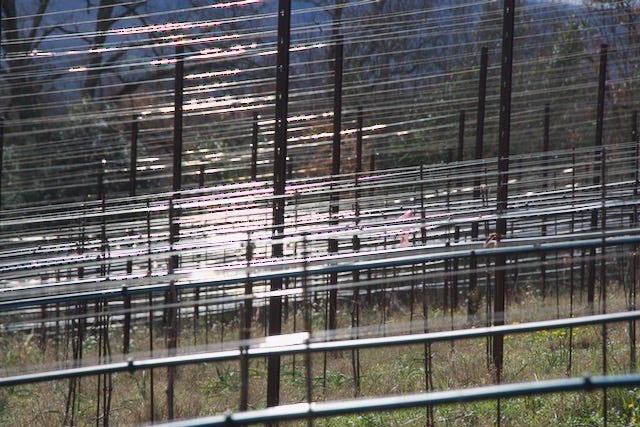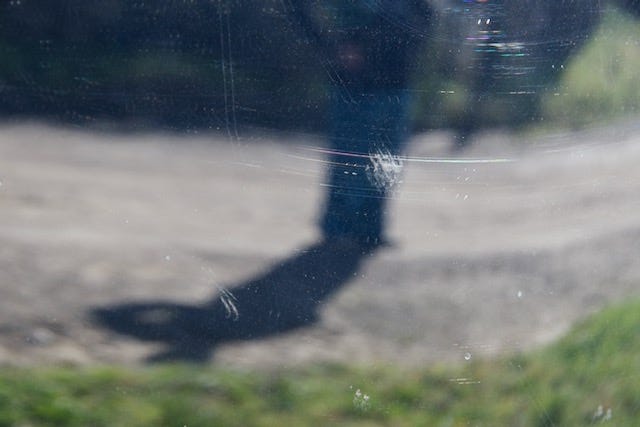Last week I wrote about how we reach plateaus in relationship to what we feel comfortable experiencing in life, often to the detriment of what we want to manifest. From a transformational perspective, these plateaus are a result of feeling that any true change of self is a threat. As that threat arises inside us, it is human nature to begin to move too fast through the discomfort. We not only plateau our sensate experience of reality but we also shift into demanding the world change to suit the perceived threat. We push reality into giving us an excuse to go back to what we know instead of embracing the transformation we can potentially undergo.

Today, I am broadening the idea of manifestation and desired transformation to include how it affects our relational self. Ultimately, we need other people to embrace our own transformations. When we enter into a a process of transformation, it is through our ability to interact and interrelate that we are able to trust the transformed self.
Because of the arising internal threat of transformational change, we tend to demand that those around us change as well. The degree of demand we hold is in a direct correlation to the threat we feel towards the transformation. The more we have the power to change, the more threatened we feel, the more demand we hold towards others. The demand inherently wounds the people we love and sabotages the possibility of transformation grounding internally. Furthermore, our inability to tolerate organic transformation that is responsive and relational means that we are incapable of seeing what is occurring around us outside the demands we hold towards others. We put blinders on without even realizing it to safely return to the known self that cannot withstand transformation.
The world gets the brunt of our own insecurities in the midst of transformational change. Most importantly, the people closest to us - in many cases our lovers, family, best friends, and life partners - suffer from the threat of our own insecurity being externalized onto them. We demand that they change with us so that we do not have to address our own distrust of the newly forming self within. We tell someone we cannot stand something about them. Our previous acceptance of an aspect of another person did not threaten the “I am” that is arising. We impatiently push a relationship to change from an organic, responsive transformational mutual genesis to a dead end of insecure closed mindedness.
Whenever we feel that speeding up is vital to a process of transformation, it is a sign that we are not trusting what is becoming within us.
For those of who you have felt this type of demand, I do want to ask you to give yourself imperfect space to exist here. Insecurity breeds demand. Distrust is a part of all new ways of relating. Impatience is absolutely natural in the midst of transformation. If you have created or are creating a demand towards someone you love, it is a perfectly normal aspect of personal transformation that needs awareness, not judgement.
However, most of us stop right at the level of demand. We do not get curious about our impatience. We do not want to look outside the realm of the demand. We cannot admit to our own insecurities of others or our distrust of self. We do not want to feel the tension of the demand itself. Allowing the underlying shadow side of the demand to become alive inside us threatens our perceived transformation. Rather than threaten our sense of self, many of us would rather leave a relationship for the fantasy of finding a new relationship that does not require patience, evolution, and slow change.
The problem lies in the fact that we often forget in our demand that other people are vital, alive, wounded, and reactive beings as well. Any true friendship reflects trust in the core of the other person’s being to change has to be self created in order to be meaningful. How can we trust another in the midst of our own self distrust?
Sometimes we also fear our actual impact on someone else. We would rather pigeon hole their transformation into a demanded change than allow for a slower metamorphosis of deep change. Yet by not trusting the core of someone we love we are inherently telling them that they are not trustworthy. We are sending them a direct message that we do not believe in them. We are not able to engage in unconditional love. We are absolutely going to rewound them with our inability to soften our own demand.
Why Is Demanding Change Wounding?
When you are unwilling or unable to allow the demand you are seeking from those you love to be met as an organic and self motivated process, you are avoiding an unfolding into dynamic inner wisdom and relational growth.
The fact is that for both our self and others, we often want change but do not want to be present for the change to occur. With those we love it is easier to externalize this process because…they are external from us. We say to a person not only “change” but also “change to become this,” or “change like I say,” or “change to be who I want you to be.” We then hold the transformation accountable to our demands. There is no room for an other in a demand.
Demand is invasive and overtakes any inner healing process. If a person does change in response to our demand, they have not engaged in their own self discovery. They are being masochistically wounded by our demand. They have to submit to stay in relationship with us.
Capitulation does not reflect genuine change but rather shows a person’s ability to submit to another’s will. Demanding change is ultimately an act of distrust.
When demand is present, the essence of the other person is being overtaken. The reflexive response is one of molding themself into their own unloved self. They are earning love to stay in a relationship, not trusting the love that exists. This is not an act of self discovery. This is not an act that addresses another’s unloved self. Harder to see, the act of demanding change in a partner ultimately reinforces the truth of their unloved self and ultimately wounds and represses their own growth and transformation.

Demand: The Shadow Side of Arising Need
The mirror of the distrust of transformation is discovered through the realm of shadow. With any change comes need. Ultimately there is a deep distrust of needs that arise as we transform. As a new relational need is trying to make its way out of shadow, it is important to understand the fallible nature of need.
True human need cannot be met perfectly in any relationship. Need has to have room for failure to be trustworthy.
A relational need has be acknowledged and then placed into the trust of the world to see what happens to it. The test is to then notice if you can metabolize the need imperfectly.
“I need to be seen.”
“I need to be valued.”
“I need to be heard.”
We know that a newly arisen need is going to be pretty greedy and perfectionist. The same is true for any deeply unmet need that lives within us. Arising needs are stringently unaware of anything but the need itself coming into our being exactly as we require.
Newly waking needs are despots. They are exacting. They want everything their way. There is no room for error and no room for another’s humanity in a newly arising need. A new need lives in black and white and demands that the world respond accordingly.
Actually what is happening is that the need is trying to find any excuse possible to go back into the realm of shadow.
Our poor partners, family, and friends. Those we love most are the sounding board for our arising need, our self trust, our insecurity, and our own transformation. Our need’s demand to be upheld is filtered as being another person’s responsibility. We demand, "If you love me, you’ll do what I need.” Our own lack of understanding how to be vulnerable and soft in our need believes this statement as a hard truth and solid boundary. The demand is essential to our own stringent desire within the need. There is no room for other people to be a normal imperfectly perfect human being.
What a beautiful medium to grow problems in a relationship!
Here we have this newly transformed self that we don’t really trust to stay the way we want it to stay, a need that is relentless in it’s desire to go back into hiding, with the third element of conscious demand still having an unconscious component. These cultivate into our inability to be interested in the other person’s need to have a slower response to our transformed self than we are comfortable with.

Why are we uninterested? Because a person is not going to transform the way we demand. Truly organic growth into mutual transformational change has to be responsive and internally driven. We need to let people around us change in response to us in their own natural way. Ultimately another person’s way is not our way. This means that another person’s transformation is not occurring…according to our own egos.
Relational Dead Zones
This is the basis for what I call the narcissistic metabolism of the other. Insecurity melds with distrust to create a demand that shows up as lack of interest. Shadow justifies the self to become exacting and inflexible. We want what we want the way we want it or in the timeframe we want it to occur. There is no room for procrastination. There is no room for human natural error. When a demand for change seems really important to us, our own transformation feels deeply threatend. This means we are more unlikely to notice a true core change happening in another.
A demand for change in another is invisible to us when it is attached to our own insecurity.
Narcissism stems from an inability to feel others presence when there is a deep insecurity in ourselves.
We are all, at times, insecure. It is more important to notice how our own insecurities get projected on those we love to the extent that our narcissism ripples out into an unseen dead space in relationships. This dead zone is full of demand and terrified of being addressed. Addressing the dead zone will change everything. Hence, why it often remains unaddressed. It’s terrifying to work with insecurity in relationship. It’s also incredibly vital and erotic.
The hard part here is that if someone IS changing, we won't notice. Why? Because narcissism thrives in projection. We are thinking we know someone else’s thoughts, actions in the future, or emotional responses. By remaining in the dead zone of demand and insecurity, we will not notice when something new happens or we will try to force a person to react in the old way even as they are trying to change their reactions. The web of demand and unprocessed acceptance creates this dead zone in which we miss what may be happening as a result of our own transformational insecurity.
This is a hidden killer of intimacy and relational growth. Finding a new ever changing being inside of someone we love is a gift we often overlook in the face of insecurity. We are preventing the necessary onion peeling of growth that needs to happen to fall deeper into love with another person. In relationships where people are trying to transform themselves, this is the place where the relationship dies.
TRAPPED!
When insecurity is threatened, the dead zone of non relational demand is defended through gaslighting and rejection. This defense is often unconscious and reflexive. It comes from our own inability or lack of willingness to trust ourselves within our unavoidably fallible and imperfect nature. You are avoiding yourself through projection of another person’s behavior. Often this is being put upon a person you love by you without you even realizing it! Because of the way insecurity leads to codependency, you may even be doing this to someone you care about without them or you ever realizing it. It just shows up as unworkable fights, repetetive conversations, and a nagging sense that your needs are never going to be met in the relationship.
Is there a way out?
Good question! The short answer is yes…but not easily. Facing insecurity is impossible for some of us. We just don’t have the container for it. This is a place where we may need professional support to learn how to be fallible and still love ourselves. We may need to lean on another person’s container for a while to discover how to have our own.
Personal insecurity is loaded with blind spots. Addressing insecurity is one of the greatest transformational tools we have to grow into more fulfilling relationships, but it is also the place that our stories and negative mindset are going to do everything possible convince us we cannot survive the ordeal.

Let’s consider the tools at our disposal.
Awareness. Are you willing to slow down enough to build it?
Compassion. What would it take to look at yourself as a person who deserves to be loved?
Time. Are you brave enough to SLOW DOWN as a process and let things unfold amongst the discomfort of tension and not knowing?
Space. Can you take space when your instinct says to engage with another and engage with another when your instinct says to take space?
Brutal Honesty. Any time we have to admit fault, take responsibility, and be vigilant about our reflexive responses we need some reflection into our own being that is NOT judgemental but honest. Are you capable of looking at yourself ourside the lens of your comforting norm?
Whenever we are in a state of demand, it is a sign that we are insecure. Insecurity leads to an inability to be relational. Simply put, riding a demand into the imperfect word as if it were a roller coaster we are choosing to be on is the simplest method into creating a relationship between the insecure self and the transformational edges of demand, distrust, and arising need. Honestly, this is an unfolding process of allowing waves of reality to move through your system without taking a hold too quickly of anything that arises. It is an art form of learning to simmer into process instead of boiling and then jumping out of what we experience.
When we feel threatened, we are not trustworthy to ourselves. When we feel demand, we are not trustworthy to others. When we have arising need with demand, our internal tyrant is running the show. All of these aspects of experience mean that these spaces are not healthy for conclusions but for allowing processes. That’s it. Coming into states of deep awareness, tolerating tension, and giving room for a process to unfold is how we get out of the trap we will inevitably lay for ourselves as we transform.



